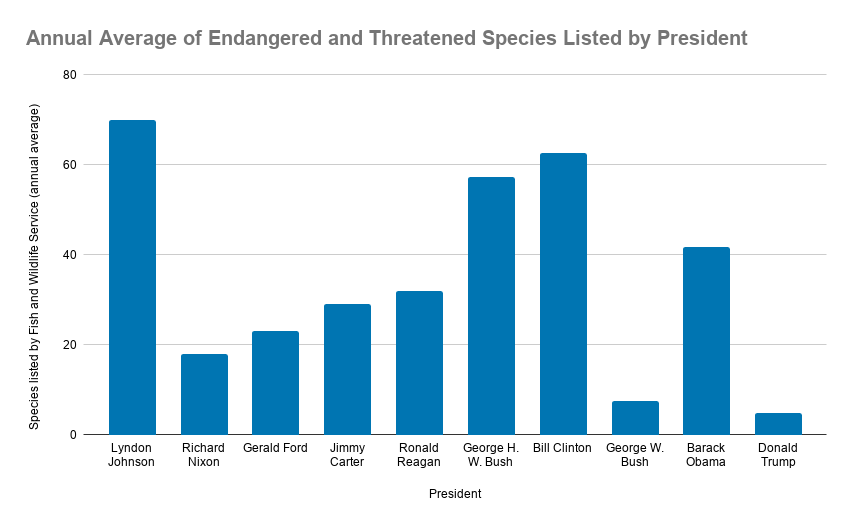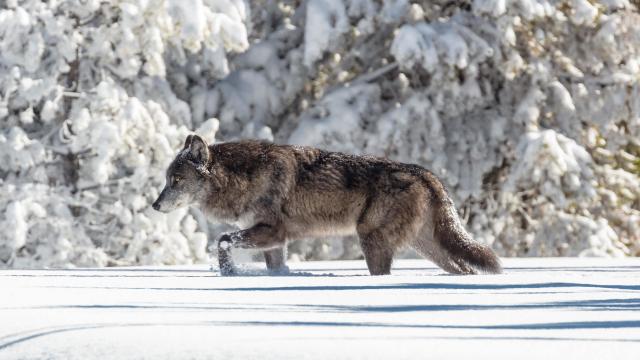There are many ways to remember U.S. President Donald Trump’s environmental legacy, none of them good. But among his most destructive will be his utter disregard for the natural world, and there’s no clearer symbol of that than the U.S. Endangered Species Act.
Trump will leave office as the stingiest user of the Endangered Species Act in history, and it’s not even close. Though his administration could have some massive change of heart in the coming weeks, it seems more likely it will be doling out pardons for cronies or the president himself instead of species pushed to the brink of extinction.
The Endangered Species Act was whipped up in 1973, after a few precursors in the 1960s. Its goal is to ensure “better safeguarding, for the benefit of all citizens, the Nation’s heritage in fish, wildlife, and plants.” Presidents have used it for all manner of species large and small, stationary or mobile. Ten presidents have had a chance to declare species endangered or threatened using the act and its precursors. But Trump has “the worst record since the act was passed,” said Noah Greenwald, the endangered species director at the Centre for Biological Diversity. The numbers bear that out.
Fish and Wildlife Services data shows Trump has approved an average of roughly five species per year for Endangered Species Act protections over his four years in office. By comparison, Obama declared roughly 42 species per year endangered or threatened over eight years. George W. Bush clocked in at a little over seven per year, which was the former nadir prior to Trump.

The National Oceanic and Atmospheric Administration can also list marine species and those that migrate to the sea. With those added in, Greenwald said, that brings Trump up to about six per year, still below George W. Bush before even factoring in his use of NOAA listings. (Sad airhorn noise)
Meanwhile, a backlog of 500 species has accrued awaiting decisions as to whether they’ll be approved for listing. That backlog predates Trump, but Greenwald said that the Obama administration came up with a plan to start to clear it out only for the Trump administration to kick it to the curb.
The Trump administration has also delisted a number of species. For some, there was a genuine reason to do so because they had recovered, and really that’s the goal of the act. But for others, reasons were more in line with Trump handing out favours to the oil and gas industry. Greenwald pointed to the American burying beetle, which was downgraded from endangered to threatened, a status that carries fewer protections.
“The Independent Petroleum Association of America, the IPAA, they petitioned to delist the American burying beetle because one of the places they occur is Oklahoma over the Permian Basin,” he said, referring to a prime fracking region. With the downlisting, Greenwald said, “they gave the oil and gas industry a giant exemption. Under the act, a threatened species doesn’t automatically get ‘take protections,’ protections against harm, killing, [or] harassment. They have to put in place a special rule in order for those protections to be applied. And what they did in Oklahoma is, they said the only places that are covered are conservation areas.”
Trump also gutted the act itself, making it harder to protect species in the first place. In doing so, he undercut one of the nation’s bedrock environmental laws, which is unfortunately all too in line with what he’s done to others, from the National Environmental Policy Act to the Clean Air Act.
“It’s just a huge loss of opportunity to have spent four years giving handouts to industries who want to be able to exploit public lands and beings instead of focusing on where we need to be using [the] Endangered Species Act, which is such a strong tool for preventing extinction,” said Addie Haughey, the director of legislative affairs for Earthjustice. “Almost every species that has been put under the protection of the Endangered Species Act is still with us, and that’s not a coincidence because the law works.”
Going forward, the incoming Biden administration will have plenty of work to do, but reversing Trump’s Endangered Species Act damage should be high on the list. Haughey noted Congress also has bills on the table to reverse Trump’s rulemaking along with a slew of other bills and amendments to other major conservation laws such as the Migratory Bird Protection Act. Really, that speaks to the fact that the environmental laws are like nails that hold the frame of a house up. Trump has torn out so many of the nails, and the whole structure of the natural world risks collapse without support.
President-elect Joe Biden could also pick up the Obama plan to speed up review. Greenwald said the best thing it could do on that front is get politics out of the decision-making and let scientists work on declarations free from interference, something that’s hardly only been an issue with the Trump administration. There’s also a need to fund programs to help species recovery, whether it’s protecting more land, restoring habitat, or enforcing violations of the act; otherwise, declarations will just be wasted.
“This isn’t supposed to just be a hospital emergency room where we leave species, and they’re there forever,” Haughey said. “This is about recovering those species, and that takes real investment.”
As a former park ranger, I would, of course, love to see this done because protecting nature is my jam. But if you can’t get super stoked about a wolf in the snow existing just for its own sake, may I also remind you without nature, we also perish. Right now, the biosphere is in a state of decline unseen in human existence with up to 1 million species at risk of extinction. Neither the Biden administration nor any other future president can save them all. But they can set the world on a more sustainable course.
“It’s really about saving ourselves as much as it’s about saving species,” Haughey said.
